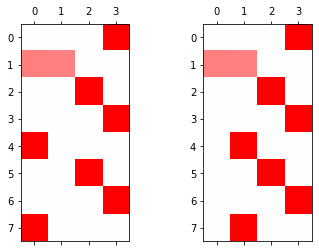import torch
import pandas as pd
import matplotlib.pyplot as pltstudy
a,b,c,d,e 를 표현함에 있어서 3개의 은닉노드면 충분하다.
- 1개의 은닉노드 -> 2개의 문자를 표현할 수 있음.
- 2개의 은닉노드 -> 4개의 문자를 표현할 수 있음.
- 3개의 은닉노드 -> 8개의 문자를 표현할 수 있음.
torch.nn.RNN(4,2)는 torch.nn.RNNCell(4,2)의 batch 버전이다.
(for문이 포함된 버전이다)
torch.nn.LSTM에서 batch size
batch size = 전체데이터는 몇 개의 시계열이 있는지 = 전체 데이터를 몇개의 시계열로 쪼갤지
- fastai, Dataloader의 batchsize 는 한 뭉치에 몇 개 있는지
원래 1은 단순히 observation의 차원이 아니다. 즉 \(x_{n \times p}\) 에서 \(n\)에 대응하는 차원으로 생각할 수 없다.
그런데 (1) 단방향 (2) 조각내지 않은 시계열 (3) 중첩하지 않은 순환망에 한정하여서는 observation 처럼 생각해도 무방하다.
현실적으로 (1)-(3)이 아닌 조건에서는 Cell 단위로 연산을 이용할 일이 없다. (느리거든요) // 그냥 이해용으로 구현
torch.nn.RNN 혹은 torch.nn.LSTM 으로 네트워크를 구성할시 _water의 dim을 명시할 일도 없다.
오로지 고려해야 할 것은 입력시계열을 조각낼지 조각내지 않을지
sig = torch.nn.Sigmoid()
soft = torch.nn.Softmax(dim=1)
tanh = torch.nn.Tanh()def f(txt,mapping):
return [mapping[key] for key in txt] txt = list('ab')*100
txt_x = txt[:-1]
txt_y = txt[1:]mapping = {'a':[1,0],'b':[0,1]}
x = torch.tensor(f(txt_x,mapping)).float().reshape(-1,2)
y = torch.tensor(f(txt_y,mapping)).float().reshape(-1,2)class mynet(torch.nn.Module):
def __init__(self):
super().__init__()
## 우리가 사용할 레이어를 정의
self.l1 = torch.nn.Linear(in_features=2,out_features=1,bias=True)
self.a1 = torch.nn.Tanh()
self.l2 = torch.nn.Linear(in_features=1,out_features=2,bias=False)
## 레이어 정의 끝
def forward(self,x):
## yhat을 어떻게 구할것인지 정의
yhat = self.l2(self.a1(self.l1(x)))
## 정의 끝
return yhatnet = mynet()loss_fn = torch.nn.CrossEntropyLoss()
optimizr = torch.optim.Adam(net.parameters())for epoc in range(5000):
yhat = net(x)
loss = loss_fn(yhat,y)
loss.backward()
optimizr.step()
optimizr.zero_grad()임베딩
mapping = {'a':0,'b':1}
x = torch.tensor(f(txt_x,mapping))
y = torch.tensor(f(txt_y,mapping))
x[:5],y[:5](tensor([0, 1, 0, 1, 0]), tensor([1, 0, 1, 0, 1]))class mynet2(torch.nn.Module):
def __init__(self):
super().__init__()
## 우리가 사용할 레이어를 정의
self.l1 = torch.nn.Embedding(num_embeddings=2,embedding_dim=1)
self.a1 = torch.nn.Tanh()
self.l2 = torch.nn.Linear(in_features=1,out_features=2)
## 레이어 정의 끝
def forward(self,x):
## yhat을 어떻게 구할것인지 정의
yhat = self.l2(self.a1(self.l1(x)))
## 정의 끝
return yhatnet = mynet2()loss_fn = torch.nn.CrossEntropyLoss()
optimizr = torch.optim.Adam(net.parameters())for epoc in range(5000):
yhat = net(x)
loss = loss_fn(yhat,y)
loss.backward()
optimizr.step()
optimizr.zero_grad()두 개의 은닉노드 이용
txt = list('abcd')*100
txt_x = txt[:-1]
txt_y = txt[1:]mapping = {'a':0,'b':1,'c':2,'d':3}
x = torch.tensor(f(txt_x,mapping))
y = torch.tensor(f(txt_y,mapping))
x[:5],y[:5](tensor([0, 1, 2, 3, 0]), tensor([1, 2, 3, 0, 1]))l1=torch.nn.Embedding(num_embeddings=4,embedding_dim=2)a1 = torch.nn.Tanh()l2 = torch.nn.Linear(in_features=2,out_features=4)net = torch.nn.Sequential(
l1,a1,l2)loss_fn = torch.nn.CrossEntropyLoss()
optimizr = torch.optim.Adam(net.parameters())for epoc in range(5000):
yhat=net(x)
loss = loss_fn(yhat,y)
loss.backward()
optimizr.step()
optimizr.zero_grad()hidden = net[:-1](x).data
yhat = soft(net(x)).datanet[:-1]Sequential(
(0): Embedding(4, 2)
(1): Tanh()
)결과 시각화 코드 10주
순환신경망 Class 사용 RNN
10주
txt = list('AbAcAd')*100
txt_x = txt[:-1]
txt_y = txt[1:]
x = torch.tensor(f(txt_x,{'A':0,'b':1,'c':2,'d':3}))
y = torch.tensor(f(txt_y,{'A':0,'b':1,'c':2,'d':3}))
x= torch.nn.functional.one_hot(x).float()
y= torch.nn.functional.one_hot(y).float()class rNNCell(torch.nn.Module):
def __init__(self):
super().__init__()
self.i2h = torch.nn.Linear(4,2)
self.h2h = torch.nn.Linear(2,2)
self.tanh = torch.nn.Tanh()
def forward(self,x,hidden):
hidden = self.tanh(self.i2h(x)+self.h2h(hidden))
return hiddentorch.manual_seed(43052)
rnncell = rNNCell()torch.manual_seed(43052)
cook = torch.nn.Linear(2,4) loss_fn = torch.nn.CrossEntropyLoss()
optimizr = torch.optim.Adam(list(rnncell.parameters())+list(cook.parameters()))T = len(x)
for epoc in range(100):
## 1~2
loss = 0
ht = torch.zeros(1,2)
for t in range(T):
xt,yt = x[[t]], y[[t]]
ht = rnncell(xt,ht)
ot = cook(ht)
loss = loss + loss_fn(ot,yt)
## 3
loss.backward()
## 4
optimizr.step()
optimizr.zero_grad()시각화코드는 10주_순환신경망구현1-성공에
순환신경망 RNN
txt = list('AbAcAd')*100
txt_x = txt[:-1]
txt_y = txt[1:]
x = torch.nn.functional.one_hot(torch.tensor(f(txt_x,{'A':0,'b':1,'c':2,'d':3}))).float()
y = torch.nn.functional.one_hot(torch.tensor(f(txt_y,{'A':0,'b':1,'c':2,'d':3}))).float()torch.manual_seed(2) #1
rnn = torch.nn.RNN(4,3).to("cuda:0")
cook = torch.nn.Linear(3,4).to("cuda:0")loss_fn = torch.nn.CrossEntropyLoss()
optimizr = torch.optim.Adam(list(rnn.parameters())+list(cook.parameters()))_water = torch.zeros(1,3).to("cuda:0")
for epoc in range(500):
## 1
hidden,hT = rnn(x.to("cuda:0"),_water)
output = cook(hidden)
## 2
loss = loss_fn(output,y.to("cuda:0"))
## 3
loss.backward()
## 4
optimizr.step()
optimizr.zero_grad()yhat = soft(output)순환신경망 Class 사용 LSTM
txt = list('hi?hello!!')*100
txt_x = txt[:-1]
txt_y = txt[1:]
mapping = {'!':0, '?':1,'h':2,'i':3,'e':4,'l':5,'o':6}
x= torch.nn.functional.one_hot(torch.tensor(f(txt_x,mapping))).float().to("cuda:0")
y= torch.nn.functional.one_hot(torch.tensor(f(txt_y,mapping))).float().to("cuda:0")class lSTMCell(torch.nn.Module):
def __init__(self):
super().__init__()
self.i2h = torch.nn.Linear(7,16)
self.h2h = torch.nn.Linear(4,16)
self.tanh = torch.nn.Tanh()
def forward(self,xt,past):
ht,ct = past
ifgo = self.i2h(xt) + self.h2h(ht)
it = sig(ifgo[0:4])
ft = sig(ifgo[4:8])
gt = tanh(ifgo[8:12])
ot = sig(ifgo[12:16])
ct = ft*ct + it*gt
ht = ot*self.tanh(ct)
return ht,ctlstmcell = lSTMCell().to("cuda:0")
linr = torch.nn.Linear(4,7).to("cuda:0")
loss_fn = torch.nn.CrossEntropyLoss()
optimizr = torch.optim.Adam(list(lstmcell.parameters())+list(linr.parameters()),lr=0.1)# 초기값셋팅
torch.manual_seed(43052)
_lstmcell = torch.nn.LSTMCell(7,4).to("cuda:0")
_linr = torch.nn.Linear(4,7).to("cuda:0")
lstmcell.i2h.weight.data = _lstmcell.weight_ih.data
lstmcell.h2h.weight.data = _lstmcell.weight_hh.data
lstmcell.i2h.bias.data = _lstmcell.bias_ih.data
lstmcell.h2h.bias.data = _lstmcell.bias_hh.data
linr.weight.data = _linr.weight.data
linr.bias.data = _linr.bias.data for epoc in range(10):
## 1
hidden = []
ht = torch.zeros(4).to("cuda:0")
ct = torch.zeros(4).to("cuda:0")
for xt,yt in zip(x,y):
ht,ct = lstmcell(xt,(ht,ct))
hidden.append(ht)
hidden = torch.stack(hidden)
output = linr(hidden)
## 2
loss = loss_fn(output,y)
## 3
loss.backward()
## 4
optimizr.step()
optimizr.zero_grad()yhat = soft(output)yhattensor([[0.0909, 0.0859, 0.0356, ..., 0.1820, 0.2308, 0.1257],
[0.3443, 0.1629, 0.2108, ..., 0.1008, 0.0506, 0.0774],
[0.3998, 0.0325, 0.5100, ..., 0.0133, 0.0269, 0.0119],
...,
[0.0655, 0.0525, 0.0455, ..., 0.1652, 0.2569, 0.2828],
[0.3850, 0.0844, 0.3754, ..., 0.0464, 0.0423, 0.0478],
[0.4012, 0.0217, 0.5328, ..., 0.0084, 0.0254, 0.0065]],
device='cuda:0', grad_fn=<SoftmaxBackward0>)순환신경망 LSTM
txt = (['one',',','two',',','three',',','four',',','five',',']*100)[:-1]
mapping = {',':0, 'one':1, 'two':2, 'three':3, 'four':4, 'five':5}
txt_x = txt[:-1]
txt_y = txt[1:]
x = torch.nn.functional.one_hot(torch.tensor(f(txt_x,mapping))).float().to("cuda:0")
y = torch.nn.functional.one_hot(torch.tensor(f(txt_y,mapping))).float().to("cuda:0")torch.manual_seed(43052)
lstm = torch.nn.LSTM(6,20).to("cuda:0")
linr = torch.nn.Linear(20,6).to("cuda:0")
loss_fn = torch.nn.CrossEntropyLoss()
optimizr = torch.optim.Adam(list(lstm.parameters())+list(linr.parameters()),lr=0.1)_water = torch.zeros(1,20).to("cuda:0")
for epoc in range(50):
## 1
hidden, (hT,cT) =lstm(x,(_water,_water))
output = linr(hidden)
## 2
loss = loss_fn(output,y)
## 3
loss.backward()
## 4
optimizr.step()
optimizr.zero_grad() soft(output)tensor([[9.9875e-01, 1.5434e-06, 6.5715e-04, 1.8973e-05, 9.5753e-05, 4.7651e-04],
[3.0184e-06, 3.7971e-05, 9.8694e-01, 3.6741e-03, 3.6129e-04, 8.9867e-03],
[9.9999e-01, 2.9932e-06, 5.9745e-07, 8.3266e-06, 1.0668e-07, 4.8888e-07],
...,
[3.9604e-05, 8.6161e-06, 1.5918e-03, 1.1244e-07, 9.9808e-01, 2.7556e-04],
[9.9993e-01, 3.3252e-07, 9.5155e-06, 4.8129e-07, 2.7274e-05, 3.2102e-05],
[8.0918e-07, 8.0716e-03, 5.9763e-04, 7.7044e-05, 6.8931e-05, 9.9118e-01]],
device='cuda:0', grad_fn=<SoftmaxBackward0>)조각난 시계열
12주차
txt = list('hi!')*3 + list('hi?')*3
txt_x = txt[:-1]
txt_y = txt[1:]
mapping = {'!':0, '?':1, 'h':2, 'i':3}
x = torch.nn.functional.one_hot(torch.tensor(f(txt_x,mapping))).float().to("cuda:0")
y = torch.nn.functional.one_hot(torch.tensor(f(txt_y,mapping))).float().to("cuda:0") torch.manual_seed(43052)
lstm = torch.nn.LSTM(4,10).to("cuda:0")
linr = torch.nn.Linear(10,4).to("cuda:0")loss_fn = torch.nn.CrossEntropyLoss()
optimizr = torch.optim.Adam(list(lstm.parameters())+list(linr.parameters()),lr=0.1)for epoc in range(100):
## 1
hidden, _ = lstm(x)
output = linr(hidden)
## 2
loss = loss_fn(output,y)
## 3
loss.backward()
## 4
optimizr.step()
optimizr.zero_grad()hidden, _ = lstm(x)
plt.matshow(soft(linr(hidden)).to("cpu").data,cmap='bwr',vmin=-1,vmax=1)
txt = list('hi!')*3 + list('hi?')*3
txt1= txt[:9]
txt2= txt[9:]
txt1_x = txt1[:-1]
txt1_y = txt1[1:]
txt2_x = txt2[:-1]
txt2_y = txt2[1:]
mapping = {'!':0, '?':1, 'h':2, 'i':3}
x1 = torch.nn.functional.one_hot(torch.tensor(f(txt1_x,mapping))).float().to("cuda:0")
y1 = torch.nn.functional.one_hot(torch.tensor(f(txt1_y,mapping))).float().to("cuda:0")
x2 = torch.nn.functional.one_hot(torch.tensor(f(txt2_x,mapping))).float().to("cuda:0")
y2 = torch.nn.functional.one_hot(torch.tensor(f(txt2_y,mapping))).float().to("cuda:0")
xx = torch.stack([x1,x2],axis=1)
yy = torch.stack([y1,y2],axis=1)torch.manual_seed(43052)
lstm = torch.nn.LSTM(4,10).to("cuda:0")
linr = torch.nn.Linear(10,4).to("cuda:0")loss_fn = torch.nn.CrossEntropyLoss()
optimizr = torch.optim.Adam(list(lstm.parameters())+list(linr.parameters()),lr=0.1)for epoc in range(100):
## 1
hidden, _ = lstm(xx)
output = linr(hidden)
## 2
loss = loss_fn(output[:,0,:],yy[:,0,:]) + loss_fn(output[:,1,:],yy[:,1,:])
## 3
loss.backward()
## 4
optimizr.step()
optimizr.zero_grad()fig , ax = plt.subplots(1,2)
ax[0].matshow(soft(output[:,0,:]).to("cpu").data,cmap='bwr',vmin=-1,vmax=1)
ax[1].matshow(soft(output[:,1,:]).to("cpu").data,cmap='bwr',vmin=-1,vmax=1)